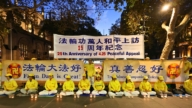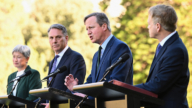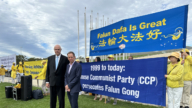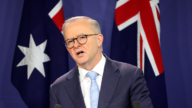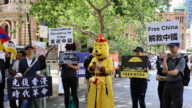【新唐人2012年6月9日訊】為了防範中共的網路間諜,澳洲國防部長史密斯在訪華前,特意將自己的手機和電腦留在香港。澳防長在訪問其他國家時,很少採取這種做法,這種罕見的反間諜防範措施,被澳洲媒體解讀為:在這趟「友善訪問」的表面下,澳洲對中國有揮之不去的不信任感。
史密斯6月6號出席澳中國防部長首次舉行的雙邊對話,與中共國防部長梁光烈會晤。雙方就中澳雙邊和防務關係、地區安全以及其他問題進行了會談。
《法新社》引述澳洲《費爾法斯》報紙的報導說,由於澳防長在此之前的訪問中,手機和電腦曾被「入侵」,因此在這次訪華前,史密斯及訪華團成員都被告知,在進入中國大陸前,要將手機和電腦留在香港。
史密斯6號在北京向記者表示,「我們非常重視部長級通訊的機密性」。
報導還引述一名外交人士的話說,「我們都知道中國,這是標準建議。我們知道部長會成為目標。他們有這樣的能力和企圖。」
新西蘭《新報》主編陳維健認為,這種考慮措施「非常有必要」。
陳維健:「現在中共在網路上可以說是無所不用其極的。作為澳大利亞國防部長,他的手機、電腦當然有很多很多的信息。在中國這樣一個環境當中,當然是有必要作出這樣的措施。」
據了解,去年3月,史密斯的電腦與澳總理和外長的電腦,都被黑客入侵。「有關黑客」被認為是來自中國,但北京完全予以否認。
陳維健:「對於入侵個人手機已經是一個公開的秘密了。因為這種新聞完全是非常無恥的,這些事情它(中共)也不在乎。」
不過,澳洲國防部長辦公室拒絕評論有關報導。
原「北京大學」法律系講師,憲政學者王天成則認為,澳防長的這種做法公然給了中共政府一個耳光。
憲政學者王天成:「可以這麼說吧,是一種姿態,是一種抗議吧,是一種不滿的表示吧。他進入中國境內他也應該會用通訊工具啊,也要打電話呀。實際上是釋放一個信息,就 是中國是網際網路安全的威脅的一個重要來源。」
不過,澳洲議會外交事務秘書馬勒斯說,中國對澳大利亞來說是一個非常重要的夥伴,澳中關係「正逐漸增強」。
西方政府顯然深知中共政府的不光彩行為,為甚麼還要加強和中共的合作呢?陳維健指出,西方政客把利益視為最大的需求。特別在近幾年,西方社會經濟不太好,在經濟上就會求助於中共。
陳維健:「西方跟中共打交道,很容易通過一些政治表態就可以得到大量的利益的情況下,他們是非常樂意跟中共打交道和獲取西方所得的利益。比如說,在人權問題上,你姿態放低一點,就可以得到大量的訂單。」
4月初,首批駐紮澳大利亞的200名美國海軍陸戰隊員,抵達澳洲北部駐地——達爾文。史密斯說,在澳大利亞部署美國海軍陸戰隊,是回應中國和印度在戰略和政治崛起的一種姿態。
陳維健:「西方社會對中共是兩面性的。它並不是說跟中國的關係搞得火熱就是認同了中國的這一套政治,包括它的對外政策。不是的,而是利益的需求。近幾年西方社會在跟中國關係越來越密切的情況下,也做好了另一手準備,對中共的防範也在不斷加強。」
今年稍早,澳洲政府因為擔心遭到中共網路攻擊,禁止由中共軍方退役工程師創立的電信設備商「華為」,投標澳洲寬頻網路建設。
採訪/秦雪 編輯/王子琦 後製/孫寧
Disbelief in “Friendly Visit” to China:
Australian Defence Minister Left Phone in Hong Kong
To prevent Chinese Communist Party’s (CCP) internet spies,
Australia’s Defense Minister, Stephen Smith,
left his cell phone and computer in Hong Kong.
Smith rarely takes similar measures
when visiting other countries.
This unusual anti-spy preventive measure is considered
by Australian media as disbelief in China during this “friendly visit.”
On June 6, Australia’s Defence Minister, Stephen Smith,
attended the bilateral conference between China and Australia.
He met his Chinese counterpart Liang Guanglie.
They talked about bilateral relations,
defense, regional security and other issues.
Agence France-Presse cited Fairfax
newspaper from (Australia).
Smith and his entourage were advised to leave their mobile
devices in Hong Kong before continuing to mainland China.
This came after Smith’s computers and mobiles
were “compromised" while on a previous trip.
“We place great score on the confidentiality of ministerial
communications," Mr Smith told reporters in Beijing.
“We all know China, that’s standard advice. We know
ministers are targets," a diplomatic source told Fairfax.
They have the capability and intent.”
Chen Weijian, Editor in Chief of New Times Weekly
in New Zealand commented.
Chen believes that these measures are “highly necessary.”
Chen Weijian: “Now the CCP uses
almost all means on the network.
As Australia’s Defense Minister, his cell and
computer must carry important information.
Therefore, such measures in China are necessary.”
It was reported that Mr Smith’s computer and that
of other Australian officials was hacked in March.
The attacks were alleged to have originated from China,
but China has dismissed the allegations.
Chen Weijian: “Attacking personal mobile phones
is already a secret known to all.
It happens a lot and it’s shameless,
but [CCP] doesn’t care about it.”
However, Smith’s office refused
to comment on related reports.
Wang Tiancheng, former law lecturer in Peking University,
and constitutionalism scholar commented.
Wang believes that Smith’s behavior gave the CCP a slap.
Wang Tiancheng: “It can be understood
as an attitude, a protest.
He must need to communicate after entering China.
He needs to make phone calls.
So actually he is releasing the message that China
is a major threat to network security.”
Richard Marles, Smith’s parliamentary secretary, however
said that Australia’s relationship with China was “growing stronger by the day.
China is a very important partner with Australia."
Obviously, these western governments know
very well about the CCP’s dishonest behavior.
Why do they want to strengthen cooperation with China?
Chen Weijian said that western politicians
consider money as the their primary goal.
Especially in these years, the western economy
is not good and they want to rely on the CCP.
Chen Weijian: “When dealing with the CCP, they easily get
huge amounts of money through some political declaration.
They would love to deal with the CCP
and get the money they want.
For example, on human rights issues, if you keep
it in a low profile, large orders will come along.”
At the beginning of April, some 200 US Marines arrived
in Darwin, as the first US troop in Australia.
Smith said that the US move was aimed at dealing
with the challenge of the rise of China and India.
Chen Weijian: “The western world has dual
character when facing the CCP.
Their drastically growing relationship with China doesn’t
mean they agree on China’s political system, nor its diplomacy.
Instead, it’s for money.
In recent years, as the western world have closer relations
with China, they have a second string to their bow.
It tightens their prevention against the CCP.”
Early this year, out of fear of the CCP’s network attacks,
the Australian government blocked Huawei from major telecom projects in Australia.
Huawei is a corporation established
by China’s retired military engineers.


